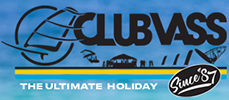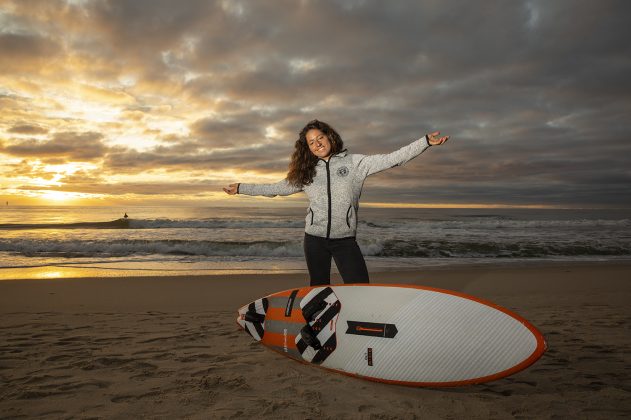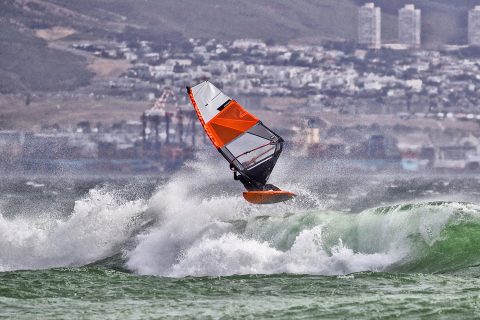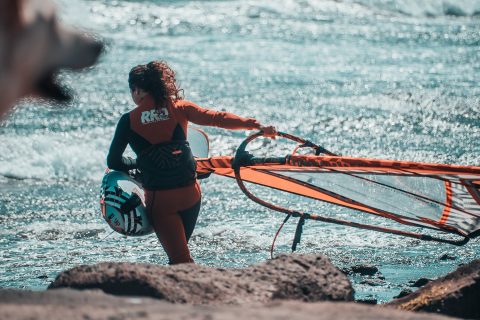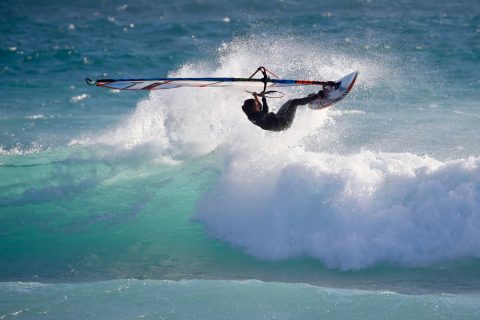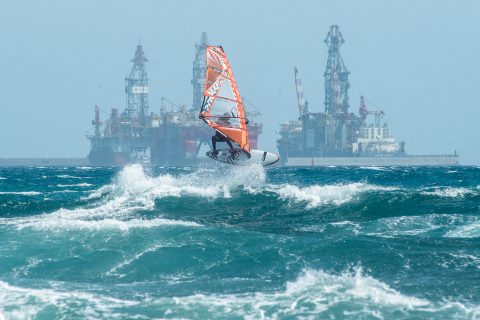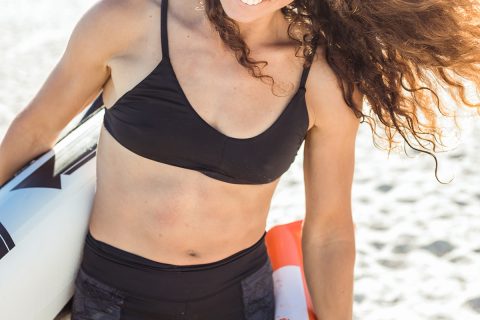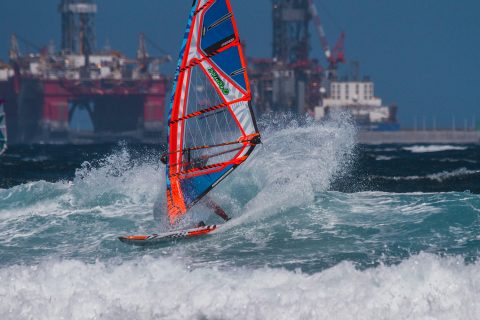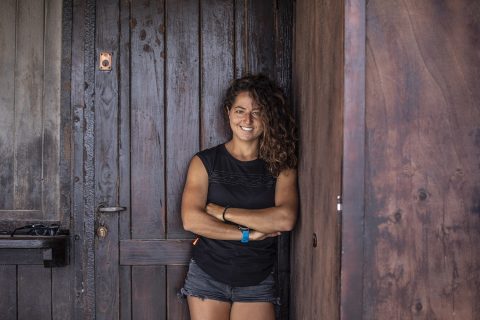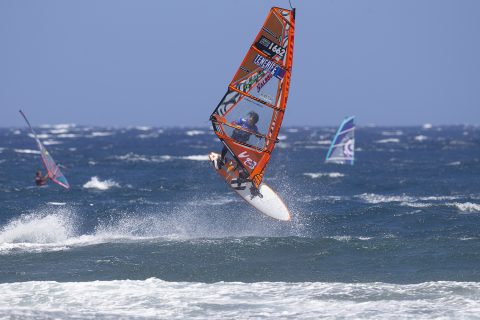This Windsurf Magazine feature with Caterina Stenta was featured in our April 2020 issue and the content was written before the Covid 19 situation. Caterina Stenta, I-662, is not only a top ranked PWA wave sailor, but also a vice world champion in SUP racing! The Italian all-rounder is known for her hard work ethic, on and off the water; she tells us more about her competitiveness, love of windsurfing and her PhD!
Words Caterina Stenta // Photos John Carter, Svetlana Romantsova & Maleen Hoekstra.
- Click to Enlarge
ORIGINS
I am 32 years old and from Italy. I live in Trieste, my home town, in the northeast of Italy, between the Alps and the sea; but I spend most of my year abroad, the summer months in the Canary Islands and travelling with SUP racing and the winter months in South Africa. When I am at home in Italy I actually don’t sail, I just focus on my SUP training. I prefer to make trips for windsurfing and search for better conditions rather than struggle with driving a lot at home for pretty flat conditions. I got into windsurfing thanks to my parents, who are both windsurfers. Every summer I’d travel with them to Greece to windsurf and they taught me the first steps; it was only at 16 that I really started to like it though.
HOOKED
When I got hooked on windsurfing back in 2006 it changed my life. Since then I’ve been organizing my life around windsurfing! I changed university (I moved to Gran Canaria first when I was 18 and then to Lisbon to do my masters). I changed all my plans in order to have as much water time as possible. Windsurfing to me is feeling good and happy. This lifestyle is healthy and fun, whether it is competing or just being in the water, it makes you fit and I enjoy every minute of it. Windsurfing, I don’t know why, but it is so addictive, and actually I got into windsurfing not as a kid, but pretty late, so there has been so much to learn and this maybe gave me more motivation to improve.
- Click to Enlarge
LESSONS
Windsurfing is a difficult sport, more than SUP for example, you need to fall many times and crash before getting one manoeuvre. You learn how to not give up, how to keep trying and eventually have the result and enjoy the process while you learn. You don’t get the results immediately, it takes time and patience, and I think this helps as well in other areas of your life. I think competing in windsurfing has helped me to get organized, and to learn how to control stress. A wave competition can be pretty stressful, you need to organize all your gear in advance, all the sails, masts, boards, booms, etc. You need to be ready at any time because you never know when it’s going to be your turn, you need to stay relaxed yet focussed to compete. I think this helped me to learn how to have patience and be focussed. I remember when I was doing my PhD exam, I was between many SUP competitions, and the day of the exam I was pretty relaxed. I think with all the organization and stress of the previous competitions I knew the best way to cope was just to take it easy.
MEMORIES
I have the best memories from wave sessions in South Africa, especially in Cape Point, in the southernmost part of Africa – sailing at sunset there and being surrounded by the amazing colours of Africa, with dolphins, penguins and seals in the water. It is so incredible and it connects you with nature. I also love just sailing with my mum, dad and brother in Paros, Greece, where I started windsurfing all those years ago and where I often still go.
- Click to Enlarge
WIPEOUT
I was sailing in Cape Point, South Africa doing the RRD photo shoot, the swell was pretty big and I got washed by a rogue set and broke my mast. Instead of just swimming back to the beach like a normal person, I just kept sailing with a broken mast towards the horizon as I was worried I’d end up on the rocks. I thought I could get through the big sets with half a rig, but I got washed again and then I lost my equipment. I was too scared to go and swim for it and maybe wash up on the rocks, so I swam alone towards a little beach close to the spot, leaving my gear in the water. When I got out, I remember John Skye scolded me, that is the only time I have ever seen him angry. I learnt to never sail away with something broken, and never to leave my gear. Then on the beach, instead of finding my gear on the rocks, I saw it still floating and going with the current, so in the end, I borrowed a surfboard from a friend, (no one really wanted to help me and go and swim for it because they
were scared of sharks). I paddled the surfboard out, rescued my gear, put the surfboard on the windsurf board with the help of the leash and finally sailed the whole lot back to shore! It seems funny now, but it wasn’t at the time, and suffice to say I learned a few lessons!
- Click to Enlarge
BAD TIMES
The worst experience I’ve had windsurfing is also in South Africa, specifically winter 2017, this time in Scarborough beach, where Roberto Ricci lives in the winter. It was a big day and the main peak close to the rocks was working, which is a rare thing there. My brother was sailing with me and he got washed and broke his gear. He tried to swim back to shore with the broken gear, but the current was pretty strong and started pushing him out to sea. At one point he couldn’t be seen any more from the beach. I don’t want to go in detail here, but those were the worst hours of my life. We called the sea rescue and helicopter and everyone on the beach was trying to calm me down. I remember the sea rescue letting me sit down in their car, they took my hand and calmed me down.
Finally it was actually Roberto Ricci, doing a downwinder with his kite, that found my brother and helped him come back to shore. While he was swimming, my brother amazingly found the equipment of another windsurfer, who had lost it earlier, so he came back to the beach by sailing that kit in, super calm and oblivious to what was happening on the beach!
- Click to Enlarge
TRAINING
For SUP I have a regular training routine, and follow a program from my trainer on and off the water; for sure this helps me be fit and injury free. I try to paddle every day, except for windsurf events, where I focus on just sailing.
I have a little gym routine that I do two times per week, and I run for 30 minutes to one hour, three to four times per week. When I windsurf, I mostly just have fun riding waves, and don’t think too much about training. But then I remind myself I want to improve in competitions, so especially for these last two years, I started to go in the water with a different mindset. This summer in Pozo, I was trying 15 to 20 back loops per session and my rule was “you cannot come out of the water until you have tried 15 back loops”. It actually paid off because in my first heat in Pozo I landed one in the first run!
This year in Pozo I filmed almost all my sessions with a good friend of mine, Christian, and by analysing the clips I try to adjust and improve my technique. I always try to ask tips from other sailors, my brother helps me with my wave riding, and other friends push me and correct me. I often speak to and share jump tips with Justyna Sniady, who is really nice, as well as other friends, especially in Pozo where I know many people. Sometimes I also speak with Alex Mussolini, Walter Scotto or Federico Morisio, who always try to explain to me how to improve my wave riding. I appreciate people giving me tips, first because they share their knowledge and second because I know they believe in you and they think you can do it. I did take some private lessons also on specific moves and I will keep doing that. Most of the time, the position of the hands and the head is the key to improving moves. There are many good girls on tour now, and they are a good inspiration because I am pretty competitive and I always want to be good or better and that all helps push my level. An inspiration in my life are my parents, they still windsurf, ski and cycle and they taught me to be passionate in life. The people I like in life, are those who are really passionate about something, whether is windsurfing or other things; to have a passion and follow it is what makes life special.
KIT
I use RRD equipment, I have the smallest production board, 70 litres, and I use it for almost every condition. I have an old 60 litre custom board also that I use sometimes in strong winds. I weigh 58 kgs and am 160 cm tall. I use RRD sails from 3.0 to 4.7; RRD has a big size range from 2.7 up! I use slim carbon booms from Al360 (one is cut to fit on my 3.0) and 100% carbon masts from Reptile masts, from 310 to 370 cm. I try to have my gear as light as possible, so all in carbon from the extensions to the masts. I use Maui Ultra fins and often play around with fin setups, sometimes I use quad, sometimes tri-fin, and in general use pretty small sizes.
- Click to Enlarge
COMPETITIVE
I am definitely competitive. I don’t really know why, but I find myself always competing while training either SUP, windsurf or any sport. I started competing in gymnastics when I was young, and I had a strict trainer in gymnastics and she taught me a lot about sports. I think part of my competitiveness comes from this. I grew up in a very sporty family also, both my parents are mountain enthusiasts and windsurfers and I have been used to training since I was very young. I started skiing and mountaineering when I was three. As soon as I could walk, I already had skis under my feet and was ‘forced’ to climb up the mountains together with my brother since we were little. I think this sporty environment plus my character has made me competitive.
INEQUALITY
I think unfortunately in the windsurf world, men are pushed more than women. The industry and sponsors in general pay less attention to women. You need to fight a lot as a girl to obtain what you deserve. You need to want it really badly to not give up. Not only in windsurfing, but in many other environments. In windsurfing though this difference is even bigger, and everyone is so used to it that some people don’t event seem to be aware of it. I think the fact, especially in windsurfing, that the market and the sponsors don’t support us as much as the men, stops us from evolving in the same way. We receive much less sponsorship than the men, and in most of the events in windsurfing the prize money is still less than half. I think this is crazy.
In the SUP scene, fortunately, the majority of the SUP races I enter now have equal prize money for men and women. This has been a huge improvement and I am happy that women are getting the recognition for their hard work. On the sponsorship side, there is room for improvement. I know that I don’t get equally paid as a female professional stand up paddler as some of my male colleagues, but I am positive that this will change in the future. In our sports, men and women are equally as important for promoting brands, winning competitions and in photo shoots.
The success that the Moreno twins have had in obtaining equal prize money in the PWA for Gran Canaria is a positive change. It is a necessary yet very important step.
I think it is important that we speak up about this inequality, so that in time this can change. If we don’t have the same possibilities, we cannot take our level to the top. I am positive that this will change. Now, there are more and more young riders pushing the level, and I hope that the industry and the community will realise that we need to change things, especially the gap in pay. This will be good for the industry as well; more female role models will push more girls in general to windsurf and this will increase the market. I am happy with my relationship with my sponsors, but it has taken a lot of hard work, passion and sometimes frustration. I have been shocked many times to see even inside my sponsors how big of a gap there is between girls and guys. I think that, with the number of women windsurfing increasing, the level going up and the same prize money in Pozo, we are slowly going in the right direction.
PHD
For over one year now I’ve been dedicating my life to my sports. Prior to this, PhD research was my job. I had a contract as a researcher for four years at the University of Tarragona, Catalunya, Spain. My PhD was about photovoltaic energy and in particular about organic materials for solar cells. The job consisted of doing research on materials, trying to optimize the production process to get the most efficient solar cells. So half of the work was inside the lab producing and developing the solar cells, and the other half was collecting data and analysing it on the computer. I was luckily able to take some time off for competitions and training, as I could decide how to organize my timetable as long as I had enough results for my PhD thesis. So when I was at the university I was working a lot, and trying to be as efficient as possible, so then I could take some breaks and go windsurfing or competing. Good time organization was the key. I was very lucky with my boss, because he always let me have free time to keep training and following my dream, but still doing my job.
- Click to Enlarge
STUDIES
Before starting the PhD I was studying materials engineering. I did my bachelor degree at the University of Trieste, Italy and part also at the University of Las Palmas in Gran Canaria. When I finished the bachelor, I wanted to move again next to the ocean. So I continued my master’s degree, still in materials engineering, at the university of Lisbon, Portugal. I lived in Lisbon for two years. In summer I’d travel to Gran Canaria to sail, and the rest of the year I was studying, surfing and always working as well with side jobs. I worked as a bartender at night in a nice bar in Lisbon to be able to pay for the summer months in the Canary Islands. I did my master thesis finally in Berlin, Germany, in a well known research centre and after five months there, I decided I didn’t want to live ever again so far from the ocean! It was good for my studies and career at that moment, but it was not my kind of environment.
DEDICATION
After finishing my PhD in June 2018 I decided to not continue working and to dedicate myself just to sport, to see how my level could improve by finally dedicating 100%. So currently I am just training. It’s a bit hard, because I don’t have enough support from my sponsors and I need to earn prize money at the competitions, but I try to get the most out of it and make sure I am not wasting any second of this opportunity I am taking. I still work on the side, and also put a lot of time into taking care of my sponsors, my media coverage, writing articles and so on, but I like it because it’s related to the sports I love.
SUP
I got into SUP racing quite by chance, I was not planning to do it. During a photo shoot for RRD, some of the RRD SUP team told me I should try it as I would be good at it and would like it. I trained with them a bit and RRD gave me a board to participate in some Italian races. I got into it pretty quickly and for two years I’ve been competing in the international SUP race scene as well. I got a silver medal in the world championships in China and have been Italian champion for three years now.
I think SUP does help my windsurfing; since I started to regularly train for SUP I feel more powerful when I windsurf. I feel stronger and I feel my wave riding has improved. I am less scared to go for aerials and hit the lips and for sure it’s helped me to stay injury free as my body is stronger and well trained. I love to combine the two tours – PWA and SUP racing. When I have too many SUP races, I can’t wait to have a windsurf competition; it keeps me motivated for both sports.
- Click to Enlarge
ADVICE
I encourage everyone, especially girls, to keep going towards their dreams and work hard for them and enjoy the path. I am really happy to be doing both sports professionally now, and I think the more watersports you do, the better athlete you become and, in this way, you can enjoy the ocean in all its aspects, whether it’s windy, wavy, choppy or flat. For me what I love the most is just the contact with water and being able to do a sport standing on the ocean. I don’t know how long I will keep competing for, but for the moment I am enjoying this lifestyle a lot, meeting inspiring athletes and increasing my knowledge about sport. With endurance sports like SUP racing there is a whole world of knowledge to learn! I like to train hard and have fun, but also take care of the ocean. Taking care of the ocean is what all ocean athletes should do I think, by avoiding single use plastic, in general try to produce less waste, and being aware of what you buy and eat! Hopefully see you in the water!

